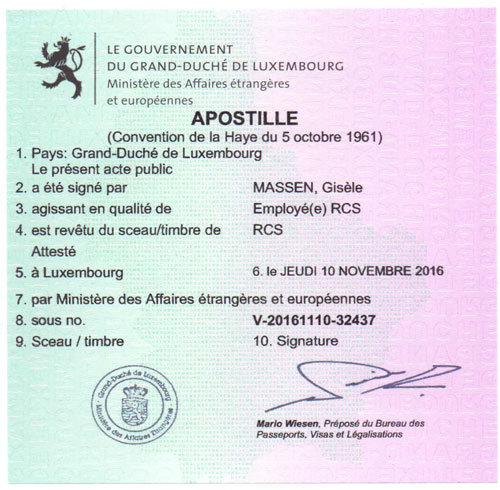
Schmidt & Schmidt covers the full spectrum of legalization services for documents issued in Luxembourg.
Luxembourg joined the Hague Convention on the Simplified Authentication of Documents on 4 April 1979; the Convention entered into force on 3 June 1979.
The apostille, or the “Hague apostille” is a certificate that authenticates the origin of a public document (e.g., a birth, marriage or death certificate, a judgment, an extract of a register or a notarial attestation). It confirms the authenticity of the signature and the authority of an official who signed the public document.
Documents issued in Luxembourg are certified with an apostille in accordance with the Hague Convention of 1961 are recognized in all Member States of the Hague Convention and do not require any other form of certification, such as consular legalization, which considerably reduces the costs and time required for the certification of documents. So far, more than 120 states have joined the Convention.
The apostille is not sufficient for use in the states that are not party to the Hague Convention. In this case, consular legalization applies to a public document.
Designated Competent Apostille Authorities in Luxembourg
The Ministry of Foreign and European Affairs (MAEE) administers the legalization service for issuing apostilles and legalizations of signatures from Luxembourg public authorities on documents intended for foreign countries' public authorities. The fee for this service is usually €20.00.
The apostille in Luxembourg is a square stamp in German, French, or Luxembourgian with the obligatory heading "Apostille" and a reference to the 1961 Hague Convention in French (Convention de La Haye du 5 octobre 1961). The apostille certificate’s sides will be at least 9 centimeters long.
Types of documents

| Can be apostillized | Cannot be apostillized |
|---|---|
|
|
Specific aspects and document requirements for the apostille in Luxembourg
When considering the apostille process in Luxembourg, specific aspects and document requirements should be noted. Apart from the cost, below you can find a few other aspects which to bear in mind.
There are two distinct legalization procedures, contingent on whether the destination country acknowledges the Hague Convention. In both cases, the legalization involves the addition of an official stamp or printed form on the original document.
Document requirements that might apply:
- The document must be an original or a certified copy issued by the competent authority.
- The document should contain all relevant and accurate information.
- The document must be in the official language of the issuing country or translated into the official language of the country where the apostille is sought.
- The apostille must be affixed by the designated competent authority in accordance with regulations.
The apostille is issued in a uniform format. In Luxembourg, it has the form of a printed sticker with a handwritten signature of an official, an official seal, and a hologram.
In cases where apostilles are not recognized, holders of foreign documents will need to legalize them instead. However, If the country of destination of the document recognizes and issues apostilles, then legalization is unnecessary.
Legalization of Luxembourg educational documents for use abroad
In order for educational documents issued in Luxembourg, such as school reports, university degree certificates, transcripts of records, enrollment certificates, and other certificates from schools or universities, to be valid and recognized abroad, they must undergo a process of certification through legalization or apostille.
To undergo legalization, these documents must be signed (not initialed) by a Luxembourg civil servant, a Luxembourg notary, or a sworn translator established and operating within Luxembourg.
To seek legal certification for Luxembourgish documents, applicants must direct their requests to the Passport, Visa, and Legalisation Office. The application process can be conveniently completed online through MyGuichet.lu, without requiring LuxTrust authentication.
Recognition of the authenticity of public documents within the EU
Luxembourg has concluded bilateral agreements with Austria, Belgium, Denmark, France, Greece, Italy, Germany, and Switzerland, according to which certain documents are exempt from any certification if they are sealed by the responsible administrative authorities.
Multilingual documents (under CIEC Convention)
Civil status certificates and certificates of marriageability, which are issued by one of the contracting states according to the model of the Convention of the International Commission (CIEC Convention) for Civil and Civil Status Affairs (CIEC), are exempt from any formality in Luxembourg.
Contracting states of the Vienna CIEC Convention of 08.09.1976 (issuance of multilingual extracts from civil status registers: birth, marriage, and death certificate) are:
- Austria, Germany, Bosnia-Herzegovina, Bulgaria, Estonia, France, Italy, Cape Verde, Cyprus, Lithuania, Luxembourg, Macedonia, Moldova, Montenegro, Netherlands, Poland, Portugal, Romania, Switzerland, Serbia, Slovenia, Spain, Turkey.
Contracting states of the Munich CIEC Convention of 05.09.1980 (issuance of multilingual certificates of marriageability) are:
- Germany, Greece, Italy, Luxembourg, Moldova, Netherlands, Portugal, Switzerland, Spain, Turkey.
Regulation on public documents (EU) 2016/1191 of 6 July 2016
Furthermore, Regulation (EU) 2016/1191 of 6 July 2016 on public documents simplifies the circulation of certain public documents that must be presented in an EU Member State and have been issued in another EU Member State, thus exempting public documents from the confirmation of authenticity with the Apostille with the aim of reducing administrative burden and costs for citizens.
Consular legalization of Luxembourg documents for use abroad
Consular legalization is the process of authenticating or certifying a legal document so a foreign country's legal system will recognize it as with full legal effect that is carried out by the diplomatic or consular mission of the country in which the document is to be used.
Consular legalization is more complex, time-consuming and costly than the simpler apostille procedure. Whereas apostille is usually issued within one step, consular legalization requires several pre-certifications before a public document can be certified at the embassy or consulate of the destination country.
It is a common requirement that the document has to be translated into the official language of the destination country before submission to the embassy. It is up to the diplomatic mission to decide about the authentication procedure.
The main differences between an apostille and consular legalization of documents
The common feature between apostille and consular legalization is that they authenticate an official document for presentation to institutions in another country. However, they have many differences.
| Apostille | Consular legalization | |
|---|---|---|
| Legal effect | Can be used in all countries that are party to the Hague Convention on the Simplified Legalization of Documents. | Use between States one or both of which is not a member of the Hague Convention, or where one of the contracting States has protested the accession of the other. |
| Difficulty | Moderate. To obtain an apostille, contact the competent apostille authority of the state of origin of the document. | High. For consular legalization, various inland authorities and a diplomatic mission of the state of destination must be involved. |
| Pre-certification | Usually not required. | Is obligatory. |
| Attestation at the state of destination embassy in the state of origin of the document | No need to contact the Consulate of the country of destination. | Is the final step of legalization. |
Apostille and consular legalization in all cities of Luxembourg
Schmidt & Schmidt provides apostille and consular legalization services for public documents originating from all regions across Luxembourg. We handle the entire process, from document review to obtaining the necessary certifications, ensuring that your documents are valid and recognized internationally. With our reliable services, you can confidently use your Luxembourg public documents abroad.
Procurement of documents from Luxembourg
If the important documents are lost or damaged, or current copies of the documents are needed, the re-issue of the documents is required. It is not unusual for people outside Luxembourg to encounter difficulties with obtaining new documents when abroad. Our consultants will help you procure new documents from Luxembourg remotely, and we can arrange for your documents to be sent by courier anywhere in the world.
Certified translation of documents from Luxembourg
Copies and transcripts of civil status documents can be translated into any language by a sworn translator in Luxembourg or the translation can be done in the country of destination. We offer certified translations of civil status documents with further certification. The cost of the work is calculated according to the volume of the document in question.
Does the translation have to be apostillized?
Any foreign document issued in one country and used in another country must be legalized for use abroad. Therefore, the authenticity of a certified translation from Luxembourg needs to be certified by an apostille. Consequently, many authorities may not accept certified translations from Luxembourg if the translation has not been properly authenticated in Luxembourg for use abroad. To avoid this confusion, translations should better be made in the state of the destination of the document.











































